You can help expand this article with text translated from the corresponding article in French. (April 2018)Click [show] for important translation instructions.
|

The Bourse du Travail is a 1,950-capacity theatre located in Lyon, France.
You can help expand this article with text translated from the corresponding article in French. (April 2018)Click [show] for important translation instructions.
|

The Bourse du Travail is a 1,950-capacity theatre located in Lyon, France.
Built in 1929, it was designated a monument historique in 1989. [1]
Some of the artists that performed at the venue include Asia, Mötley Crüe, Blue Öyster Cult, Iggy Pop and Metallica. [2] [3]

Fernand Léonce Émile Pelloutier (1867–1901) was a French journalist, trade union organiser and anarcho-syndicalist theoretician. A revolutionary from an early age, after beginning a career in journalism, Pelloutier became involved in socialist politics. He briefly joined the French Workers' Party, but following a disagreement with its leader over his proposal for a general strike, he left the party and joined the anarchist movement. He became the leader of the Bourses du Travail, in which he advocated for anarcho-syndicalism. Having suffered from tuberculosis luposa for most of his career, he eventually succombed to the disease, and died in 1901 at the age of 33.

Line B is a line on the Lyon Metro in France that runs between Charpennes–Charles Hernu and Saint-Genis-Laval–Hôpital Lyon Sud. It was constructed using the cut-and-cover method, and went into service on 2 May 1978. Together with Line A, it was one of the inaugural lines of the Lyon Metro. It has since been extended three times: from Part-Dieu to Jean Macé in 1981, from Jean Macé to Stade de Gerland in 2000, from Stade de Gerland to Oullins railway station in 2013 and to Saint-Genis-Laval–Hôpital Lyon Sud in 2023. The line serves 12 stations, and is 10.2 kilometres (6.3 mi) long. Line B trains run on tires rather than steel wheels; it is a rubber-tired metro line.
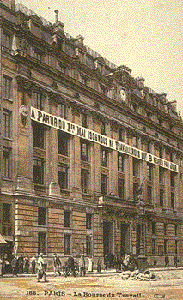
The Bourse du Travail, a French form of the labour council, were working class organizations that encouraged mutual aid, education, and self-organization amongst their members in the late nineteenth and early twentieth centuries.

Parc Olympique Lyonnais, known for sponsorship reasons as Groupama Stadium, is a 59,186-seat stadium in Décines-Charpieu, in the Metropolis of Lyon. The home of French football club Olympique Lyonnais (OL), it replaced their previous stadium, the Stade de Gerland, in January 2016. The Stade de Gerland became the home of Lyon OU Rugby. It's the third largest stadium in France, behind Stade de France in Saint-Denis (Paris) and Orange Velodrome in Marseille.
The Inspection du travail is a specialist agency of the French civil service, responsible for investigating employment conditions and enforcing labour law, created in 1892 during the Third Republic.

The Lyon tramway comprises eight lines, seven lines operated by TCL and one by Rhônexpress, in the city of Lyon, France. The original tramway network in Lyon was developed in 1879; the modern network started operation in 2001.

La Part-Dieu is an area of Lyon Metropolis. It is also the second largest tertiary district in France, after La Défense in Greater Paris. The area contains the Part-Dieu train station.
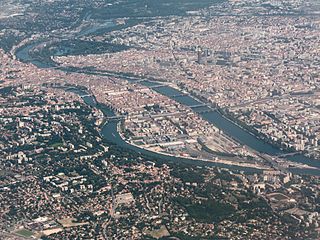
The Presqu'île is the central part of the City of Lyon, France. Extending from the foot of the Croix-Rousse hill in the north to the confluence of the Rhône and the Saône rivers in the south, it has a preponderance of cafés, restaurants, luxury shops, department stores, banks, government buildings and cultural institutions.

The 3rd arrondissement of Lyon is one of the nine arrondissements of the City of Lyon.
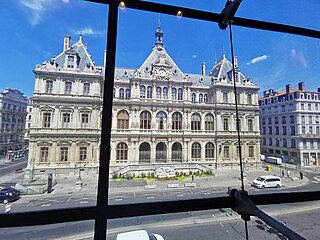
The Palais de la Bourse or Palais du Commerce is a building located in the quarter Les Cordeliers, in 2nd arrondissement of Lyon. It currently houses the headquarters of the Chamber of Commerce and Industry of Lyon. It is served by the metro station Cordeliers, and by bus lines C3,13, 18, 23, 25, 28, 58, 71, 91 and 99.
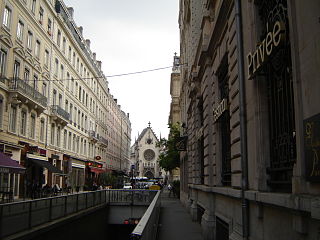
The Rue de la Bourse is a street located mainly in the 2nd arrondissement of Lyon, and also in the 1st arrondissement. It starts on the Place des Cordeliers, in the 2nd arrondissement, in front of the Église Saint-Bonaventure, and ends at right angles to the Rue du Bât-d'Argent, beyond which it is extended by the Rue du Garet.
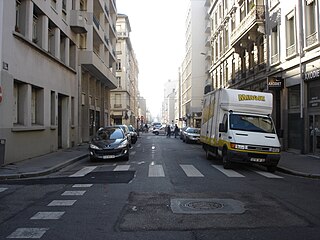
La Rue de Créqui is a very long street located in the 7th, 3rd and 6th arrondissements of Lyon. It is a long straight line along the rue Duguesclin or the rue de Vendôme, that begins on the Grande Rue de la Guillotière in the 7th arrondissement and ends at the north in the 6th, on the Boulevard des Belges. It follows the Place Guichard, located in the 3rd arrondissement.

In the Present – Live from Lyon is a 2-CD/DVD live album by Yes, released on 29 November 2011 in North America and 2 December 2011 in Europe.

The École nationale supérieure des sciences de l'information et des bibliothèques is a French grande école based in Villeurbanne, near Lyon. It is administered by the Ministry of Higher Education, Research and Innovation.

Georges Louis François Yvetot was a French typographer, anarcho-syndicalist and anti-militarist. He was secretary general of the Fédération des Bourses de travail and deputy secretary general of the Confédération générale du travail in the period leading up to World War I (1914–18). He kept a low profile during the war, and in 1918 was dismissed from the CGT leadership. After the war he contributed to many anarchist journals. He died in poverty during World War II (1939–45).
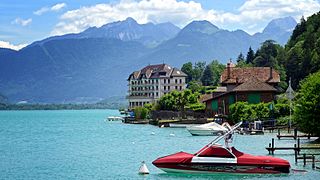
Auvergne-Rhône-Alpes is a region in southeast-central France created by the 2014 territorial reform of French regions; it resulted from the merger of Auvergne and Rhône-Alpes. The new region came into effect on 1 January 2016, after the regional elections in December 2015.

Paul Delesalle was a French anarchist and syndicalist who was prominent in the trade union movement. He started work as a machinist, became a journalist, and later became a bookseller, publisher and writer.

Eugène Hénaff was a French cement worker, Communist, trade union leader and member of the French Resistance during World War II (1939–45).

François Joseph Ducoux was a French physician, left-wing politician and businessman. He served as a military physician from 1828 to 1838 before settling in Blois and engaging in local politics. He was a representative in the National Assembly during the French Second Republic, and as Prefect of the Paris Police helped restore order after the bloody June Days uprising. He introduced legislation to establish the Bourse du Travail, but this was rejected. He left politics during the Second French Empire, but was again a representative in the National Assembly in the first years of the French Third Republic.

The ceintures de Lyon were a series of fortifications built between 1830 and 1890 around the city of Lyon, France, to protect the city from foreign invasion.
45°45′33″N4°50′54″E / 45.7593°N 4.8482°E